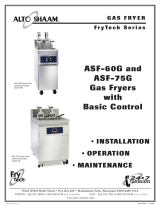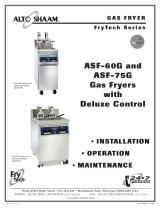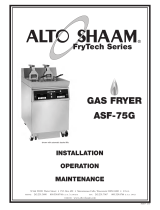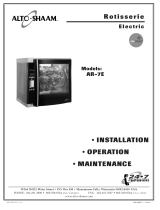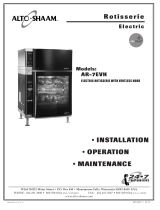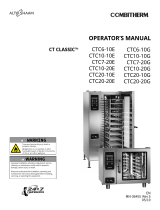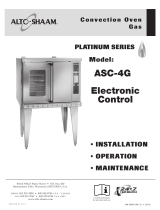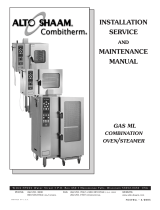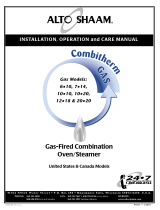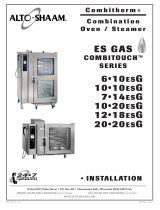Page is loading ...

P R I N T E D I N U .S .A .
R o t i s s e r i e
G a s
Models:
AR-6G
• INSTALLATION
• OPERATION
• MAI NTENANCE
W164 N9221 Water Street • P.O. Box 450 • Menomonee Falls, Wisconsin 53052-0450 USA
PHONE: 262.251.3800 • 800.558.8744
USA/CANADA FAX: 262.251.7067 • 800.329.8744 U.S.A. ONLY
www.alto-shaam.com
MN-28648 • 08/09

i
Delivery . . . . . . . . . . . . . . . . . . . . . . . . . . . . . . . . . . 1
Unpacking . . . . . . . . . . . . . . . . . . . . . . . . . . . . . . . . 1
Safety Procedures and Precautions . . . . . . . . . . . . . 2
Installation
Common Specifications . . . . . . . . . . . . . . . . . . . . 3
Accessories. . . . . . . . . . . . . . . . . . . . . . . . . . . . . 3
Dimension Drawings . . . . . . . . . . . . . . . . . . . . . . 4
Technical Components . . . . . . . . . . . . . . . . . . . . 5
Installation Codes & Standards . . . . . . . . . . . . . . 6
Ventilation Requirements. . . . . . . . . . . . . . . . . . . 6
Positioning on Site . . . . . . . . . . . . . . . . . . . . . . . 6
Positioning Requirements . . . . . . . . . . . . . . . . . . 7
Ventilation Instructions . . . . . . . . . . . . . . . . . . . . 8
Electrical . . . . . . . . . . . . . . . . . . . . . . . . . . . . . . . 9
Air Supply . . . . . . . . . . . . . . . . . . . . . . . . . . . . . 10
Air Adjustments . . . . . . . . . . . . . . . . . . . . . . . . . 10
Gas Connections . . . . . . . . . . . . . . . . . . . . . 11-13
Securing Electrical Access Cover . . . . . . . . . . . 13
Leak Testing . . . . . . . . . . . . . . . . . . . . . . . . . . . 14
Gas Exhaust . . . . . . . . . . . . . . . . . . . . . . . . . . . 14
Ignition System . . . . . . . . . . . . . . . . . . . . . . . . . 14
Operating Instructions
Burner Lighting Instructions . . . . . . . . . . . . . . . . 15
Controls . . . . . . . . . . . . . . . . . . . . . . . . . . . . . . 16
Door Catch . . . . . . . . . . . . . . . . . . . . . . . . . . . . 16
Placement & Adjustment of Spits. . . . . . . . . . . . 17
Product Preparation . . . . . . . . . . . . . . . . . . . . . 17
Skewer Preparation & Loading . . . . . . . . . . . . . 18
Cooking Time . . . . . . . . . . . . . . . . . . . . . . . . . . 18
Care and Cleaning
Equipment Care . . . . . . . . . . . . . . . . . . . . . . . . 19
Daily Cleaning . . . . . . . . . . . . . . . . . . . . . . . . . . 19
Cleaning & Reseasoning Cast Iron Tiles . . . . . . 20
Maintenance
Changing of Light Bulbs . . . . . . . . . . . . . . . . . . 20
Opening Machine Compartments. . . . . . . . . . . . 20
Service
Troubleshooting Guide . . . . . . . . . . . . . . . . . . . 21
Full Assembly View & Part List . . . . . . . . . . . . . 22
Final Floor Assembly View & Part List . . . . . 23-24
Motor Mount Assembly View & Part List. . . . . . . 25
Top Assembly View & Part List . . . . . . . . . . . . . 26
Bottom Assembly View & Part List . . . . . . . . 27-28
Gas Plumbing Assembly & Part List . . . . . . . 27-28
Bulb Replacement . . . . . . . . . . . . . . . . . . . . . . . 29
Wire Diagrams
AR-6G, 120V. . . . . . . . . . . . . . . . . . . . . . . . . . . 30
Installation Checklist
Clearances . . . . . . . . . . . . . . . . . . . . . . . . . . . . 31
Gas connections . . . . . . . . . . . . . . . . . . . . . . . . 31
Physical Condition. . . . . . . . . . . . . . . . . . . . . . . 31
Warranty
Transportation Damage and Claims. . . Back Cover
Limited Warranty . . . . . . . . . . . . . . . . . Back Cover
D A N G E R
DO NOT store or use gasoline or other
flammable vapors or liquids in the
vicinity of this or any other appliance.
D A N G E R
IMPROPER INSTALLATION,
ALTERATION, ADJUSTMENT,
SERVICE, OR MAINTENANCE COULD
RESULT IN SEVERE INJURY, DEATH
OR CAUSE PROPERTY DAMAGE.
READ THE INSTALLATION,
OPERATING AND MAINTENANCE
INSTRUCTIONS THOROUGHLY
BEFORE INSTALLING OR SERVICING
THIS EQUIPMENT.

AR-6G Rotis serie Operat ion & Care Manual • 1
D E L I V E R Y
This Alto-Shaam appliance has been
thoroughly tested and inspected to insure only the
highest quality unit is provided. Upon receipt,
check for any possible shipping damage and report
it at once to the delivering carrier. See
Transportation Damage and Claims section
located in this manual.
This appliance, complete with unattached
items and accessories, may have been delivered in
one or more packages. Check to ensure that all
standard items and options have been received
with each model as ordered.
Save all the information and instructions
packed with the appliance. Complete and return
the warranty card to the factory as soon as
possible to assure prompt service in the event of a
warranty parts and labor claim.
This manual must be read and understood by
all people using or installing the equipment
model. Contact the Alto-Shaam service
department if you have any questions concerning
installation, operation, or maintenance.
NOTE: All claims for warranty must include the
full model number and serial number of
the unit.
U N P A C K I N G
1. Carefully remove the
appliance from the
carton or crate.
NOTE: Do not discard the
carton and other
packaging material
until you have
inspected the unit
for hidden damage
and tested it for
proper operation.
2. Read all instructions in this manual carefully
before initiating the installation of this appliance.
DO NOT DISCARD THIS MANUAL.
This manual is considered to be part of the
appliance and is to be provided to the owner or
manager of the business or to the person
responsible for training operators. Additional
manuals are available from the Alto-Shaam
service department.
3. Remove all protective plastic film, packaging
materials, and accessories from the appliance
before connecting electrical power. Store any
accessories in a convenient place for future use.
®
®
THE INFORMATION CONTAINED IN THIS
MANUAL IS IMPORTANT FOR THE PROPER
INSTALLATION OF THIS OVEN
. PLEASE
READ CAREFULLY AND RETAIN FOR
FUTURE REFERENCE
.
IMPROPER CONNECTION OF THIS APPLIANCE
WILL NULLIFY ALL WARRANTIES
.
LES INFORMATIONS CONTENUES DANS
CE MANUEL SONT IMPORTANTES POUR
L
'INSTALLATION L'UTILISATION ET
L
'ENTRETIEND DE CE FOUR. S'IL VOUS
PLAIT LISEZ
-LE TRES ATTENTIVEMENT
ET CONSERVEZ
-LE.
LA NON-APPLICATION DE CES CONSIGNES
ANNULE TOUTES GARANTIES
.
C A U T I O N
TO PREVENT PERSONAL INJURY,
USE CAUTION WHEN MOVING OR
LEVELING THIS APPLIANCE.

AR-6G Rotis serie Operat ion & Care Manual • 2
1. This appliance is intended to cook, hold or
process foods for the purpose of human
consumption. No other use for this appliance is
authorized or recommended.
2. This appliance is intended for use in commercial
establishments where all operators are familiar
with the purpose, limitations, and associated
hazards of this appliance. Operating
instructions and warnings must be read and
understood by all operators and users.
3. Any troubleshooting guides, component views,
and parts lists included in this manual are for
general reference only and are intended for use
by qualified technical personnel.
4. This manual should be considered a permanent
part of this appliance. This manual and all
supplied instructions, diagrams, schematics,
parts lists, notices, and labels must remain with
the appliance if the item is sold or moved to
another location.
N O T E : Used to notify personnel of
installation, operation, or
maintenance information that is
important but not hazard related.
C A U T I O N
Used to indicate the presence of a hazard that can
or will cause minor personal injury, property
damage, or a potential unsafe practice if the
warning included with this symbol is ignored.
C A U T I O N
Used to indicate the presence of a
hazard that can or will cause minor or
moderate personal injury or property
damage if the warning included with
this symbol is ignored.
D A N G E R
Used to indicate the presence of a
hazard that WILL cause severe
personal injury, death, or substantial
property damage if the warning
included with this symbol is ignored.
W A R N I N G
Used to indicate the presence of a
hazard that CAN cause personal injury,
possible death, or major property
damage if the warning included with
this symbol is ignored.
SAFETY PROCEDURES
AND PRECAUTIONS
Knowledge of proper procedures is essential to the
safe operation of electrically and/or gas energized
equipment. In accordance with generally accepted
product safety labeling guidelines for potential
hazards, the following signal words and symbols
may be used throughout this manual.
N O T E
For equipment delivered for use
in any location regulated by the
following directive:
DO NOT DISPOSE OF ELECTRICAL
OR ELECTRONIC EQUIPMENT WITH
OTHER MUNICIPAL WASTE.

AR-6G Rotis serie Operat ion & Care Manual • 3
I N S TA L L AT I O N
C O M M O N S P E C I F I C AT I O N S
A C C E S S O R I E S
AR-6G
Overall height 78-1/8" 1983mm
Overall width 62-15/16" 1599mm
Overall depth 32-5/8" 828mm
Height Cooking cavity 53-3/4" 1365mm
- Pedestal 12-3/16" 309mm
- Overall 22-1/2" 571mm
Total weight, empty 1385 lbs 628 kg
ACC E S SORI E S U SEA B L E SPA CE (L X W X D )
• MULTI-PURPOSE BASKET,
(38.75" x 5.25" x 6.375")
SI-27510
• SHANK BASKET,
(38.75" x 4.75" x 5.5")
SI-27506
• WHOLE PRODUCT SKEWER,
(38.75" x 5.25" x 5.5")
SI-27508
• HEAVY DUTY “V” SKEWER,
(37" of usable length)
5005514
• ROASTING TRAY
(40.75" x 11.25" x 2.0")
1008581
Thirty Six (36) Chicken Roasting Unit
SI-27510
Multipurpose Basket
5005514
Heavy Duty “V” Skewer
SI-27508
Whole Product Skewer
SI-27506
Shank Basket
1008581
Roasting Tray

AR-6G Rotis serie Operat ion & Care Manual • 4
I N S TA L L AT I O N
T E C H N I C A L S P E C I F I C AT I O N S
78-7/8" (2003mm)
8-7/16"
(213mm)
1
8-3/16"
(
461mm)
54-5/8" (1387mm)
5
0-7/8" (1292mm)
TO POWER CORD
3
1-7/16" (798mm)
TO GAS LINE
62-15/16" (1599mm)
78-1/8" (1983mm)
16-3/4 " (425mm)
TO DRIP TRAY
32-5/8" (828mm)
6-1/2" (165mm)
TO POWER CORD
5-5/8" (142mm)
TO GAS LINE
9-3/4"
(247mm)
TO GAS LINE
78-1/8" (1983mm)
50" (1193mm)
CAVITY WIDTH
23-1/2" (597mm)
DOOR WIDTH
49-5/8" (1260mm)
DOOR HEIGHT
53-3/4" (1365mm)
CAVITY HEIGHT
1
2-11/16"
(321mm)
CAVITY DEPTH
56" (1424mm)
DIME N SION S (HXWXD)
EXTERIOR:
78-1/8" x 62-15-16" x 32-5/8"
(1983mm x 1599mm x 828mm)
INTERIOR: 53-3/4" x 50" x 12-11/16"
(1365mm x 1193mm x 321mm)

AR-6G Rotis serie Operat ion & Care Manual • 5
I N S TA L L AT I O N
NOTE: Note dimensions required for doorways and
aisles for access of the appliance and pallet to
the installation site. Transport the appliance
in an upright and level position only. Do not
tilt the appliance.
S I T E I N S TA L L AT I O N
®
D A N G E R
IMPROPER INSTALLATION,
ALTERATION, ADJUSTMENT,
SERVICE, OR MAINTENANCE COULD
RESULT IN SEVERE INJURY, DEATH
OR CAUSE PROPERTY DAMAGE.
READ THE INSTALLATION,
OPERATING AND MAINTENANCE
INSTRUCTIONS THOROUGHLY
BEFORE INSTALLING OR SERVICING
THIS EQUIPMENT.
D A N G E R
AVERTISSEMENT : UNE INSTALLATION,
UN AJUSTEMENT, UNE ALTÉRATION,
UN SERVICE OU UN ENTRETIEN NON
CONFORME AUX NORMES PEUT CAUSER
DES DOMMAGES À LA PROPRIÉTÉ, DES
BLESSURES OU LA MORT.
LIRE ATTENTIVEMENT LES DIRECTIVES
D’OPÉRATION ET D’ENTRETIEN AVANT
DE FAIRE L’INSTALLATION, OU
L’ENTRETIEN DE CET ÉQUIPEMENT.
C A U T I O N
THE APPLIANCE MUST REMAIN ON
THE PALLET WHILE BEING MOVED
TO THE INSTALLATION SITE BY
FORK LIFT OR PALLET LIFT TRUCK.
T E C H N I C A L C O M P O N E N T S
SPITS MOTOR SWITC H
Number 6 Number 3
Usable length 37" (940mm)
BU LBS
DRIVING MOTORS
120V, 60W, INCANDESCENT 3
Number 6 12V, 20W, HALOGEN 3
Voltage, unit power 120V/60Hz
POWER COR D PLUG TYPE
GAS BURNERS
2 prongs + ground
NEMA 5-15P
15A, 12 5V PLUG
Type: direct flame Yes
CAPACITY
Number 3 Bird 144 lb / 168 lb
UNIT POWER RATING TOTAL ELECTRIC
Propane 195,000 BTU Consumption 6 AMPS
Natural 195,000 BTU

AR-6G Rotis serie Operat ion & Care Manual • 6
I N S TA L L AT I O N
S I T E I N S TA L L AT I O N
VENTILATION REQUIREMENTS
A ventilation hood is mandatory for the operation of
the appliance. The ventilation hood must be installed in
accordance with local building codes for the steam exhaust
and must protrude 12" to 20" (300 to 500mm) over the front
side of the appliance. A grease filter must be located in the
protruding area of the hood. Grease filters should be
thoroughly cleaned on a regular basis following
manufacturer's instruction. Ventilation hoods must ensure
an adequate amount of incoming air during operation and
must be operated whenever the appliance is used.
POSITIONING ON SITE
Lift the appliance from the pallet with a fork lift or
pallet lift truck positioned at the front of the appliance. For
damage protection, the use of two wooden boards, placed
between the bottom of the appliance and the lifting forks, is
strongly recommended.
Stand the appliance in a level position. Use the
adjustable casters to overcome an uneven floor and ensure
that the unit is level.
To insure proper operation, the installation of this
appliance must be completed by qualified technicians in
accordance with the instructions provided in this manual.
Failure to follow the instructions provided may result in
damage to the appliance, building, or cause personal injury
to personnel.
INSTALLATION CODES & STANDARDS
The following codes and standards are required for installation of this appliance: AIR SUPPLY,
ELECTRICAL CONNECTIONS, WATER CONNECTIONS, GAS CONNECTIONS, GAS EXHAUST, AND
WASTE WATER DISCHARGE.
Installation must comply with local codes required for gas appliances. In the absence of local codes, installation must
comply with the National Fuel Gas Code, ANSI Z223.1 (latest edition). In Canada, the appropriate code is the Natural
Gas Installation Code, CAN/CGA-B149.1 or the Propane Installation Code, CAN/CGA-B. Adherence to code by a
qualified installer is essential for the following: Gas Plumbing, Gas Appliance Installation, Commercial Cooking
Ventilation, Water and Plumbing, and OSHA Regulations.
STANDARD FOR GAS FOOD SERVICE EQUIPMENT
ANSi Z83, 11-2006/CSA 1.8 - 2006
The information contained in this manual is important for the proper installation,
use and maintenance of this appliance. Please read carefully and retain for future
reference. Improper connection of this appliance will nullify all warranties.
C A U T I O N
TO PREVENT PERSONAL INJURY,
USE CAUTION WHEN MOVING OR
LEVELING THIS APPLIANCE.
ANSI / NSF4
MINIMUM CLEARANCE REQUIREMENTS
BOTH SIDES
18" (4 57mm)
BACK
4" (10 2 mm)
TOP
20" (5 08mm) FOR AI R M OVEMEN T

AR-6G Rotis serie Operat ion & Care Manual • 7
I N S TA L L AT I O N
POSITIONING REQUIREMENTS
In order to ensure proper ventilation, a minimum
d
istance of at least 18" (457mm) must be kept from
the side panels (left and right) of the appliance and
any adjoining surfaces.
NOTE: If adequate service clearance is not provided,
it will be necessary to disconnect the gas
connection to move the appliance. Charges in
connection with inadequate service access are
not covered under warranty.
Allow a minimum clearance of 4" (102mm) from the
back of the appliance for gas plumbing connections.
Allow a 20" (500mm) clearance at the top of the
appliance for free air movement and for the vent(s)
located at the top.
Do not install the appliance adjacent to heat producing
equipment such as fryers, broilers, etc. Heat from such
appliances may cause damage to the Electrical
Components of the appliance. Minimum clearance
recommended: 20" (500mm)
Place the appliance on a stable, noncombustible level
horizontal surface. Level the appliance front-to-back and
side-to-side by means of the adjustable casters.
Rear of unit should be slightly elevated via caster
adjustment to allow the doors to remain open while
operator is working in the unit.
S I T E I N S TA L L AT I O N
79" (1999mm)
18"
(457mm)
18" (457mm)
77-1/2"
(1969mm)
20"
(508mm)
4"
(102mm)
4"
(102mm)
45" (1140mm)

AR-6G Rotis serie Operat ion & Care Manual • 8
I N S TA L L AT I O N
V E N T I L AT I O N I N S T R U C T I O N S
An adequate ventilation system is required for commercial
cooking equipment. Information may be obtained by
writing to the National Fire Protection Association,
Batterymarch Park, Quincy, MA 02269. When writing refer
to NFPA No. 96.
1. A single gas appliance requires a minimum of 32 CFM
make-up air for natural and propane gas. Kitchen
ventilation must include a provision for an adequate
flow of fresh air for gas combustion and to prevent a
negative-pressure condition. The rear of the appliance
provides air supply access for gas combustion and
must be kept clear at all times. DO NOT obstruct or
restrict ventilation nor the air flow required to
support combustion.
2. DO NOT obstruct the flow of the exhaust flue at the
top of the appliance. It is especially critical that gas
supply piping and electrical support cord and/or
receptacle be routed away from the path of the hot
combustion fumes.
3. Make certain the appliance installation maintains
adequate air ventilation to provide cooling for
electrical and gas components. The area around the
appliance should be clear of any obstructions which
might retard the flow of cooling air. Failure to observe
this caution may result in damage to the components
and will void the warranty.
4. This appliance cannot be direct vented.
5. Install the appliance under a ventilation hood
meeting all applicable code requirements.
Combustion fumes must be vented in accordance
with local, state, or national codes.
Ventilating hoods and exhaust systems shall be
permitted to be used to vent appliances installed in
commercial applications.
Where automatically operated appliances are vented
through a ventilating hood or exhaust system equipped
with a damper or with a power means of exhaust,
provisions shall be made to allow the flow of gas to the
main burners only when the damper is open to a position
to properly vent the appliance and when the power
means of exhaust is in operation. IN ACCORDANCE
WITH NFPA 54 COMMONWEALTH OF
MASSACHUSETTS ONLY.
D A N G E R
Installation, air adjustment and/or
service work must be in accordance
with all local codes and must be
performed by a certified service
technician qualified to work on
gas appliances.
C A U T I O N
To prevent malfunction or cause
negative back draft, DO NOT obstruct
exhaust flues or attach any flue
extension that will impede proper
burner operation.
C A U T I O N
DO NOT USE CIRCULATING FANS
ON THE FLOOR. FLOOR FANS WILL
AFFECT BURNER OPERATION.
W A R N I N G
Inadequate ventilation, or failure to
ensure an adequate supply of fresh
air will result in a high ambient
temperature at the sides of the
appliance. An excessive ambient
temperature can cause the thermal-
overload protection motor to trip
resulting in severe damage to the
cooling fans.
D A N G E R
FAILURE TO VENT THIS APPLIANCE
PROPERLY MAY BE HAZARDOUS TO
THE HEALTH OF THE OPERATOR.
Equipment damage, operational
problems and unsatisfactory baking
performance may also be the
consequence of improper venting.
Any damage sustained by a failure to
properly vent this oven are not
covered under warranty.

AR-6G Rotis serie Operat ion & Care Manual • 9
I N S TA L L AT I O N
E L E C T R I C A L
An electrical wiring diagram is located under the
a
ccess panel beneath the drip tray of the appliance.
This appliance must be branch circuit protected with
p
roper ampacities, in accordance with the wiring
diagram located in the electrical compartment of the
appliance. The appliance must be properly grounded
in accordance with the National Electrical Code and
applicable local codes.
Wire size for the main incoming power to the unit must
m
atch the minimum size listed in the specifications
applicable to the specific appliance.
D A N G E R
ENSURE POWER SOURCE
MATCHES VOLTAGE STAMPED
ON APPLIANCE NAMEPLATE.
D A N G E R
To avoid electrical shock, this
appliance MUST be adequately
grounded in accordance with local
electrical codes or, in the absence of
local codes, with the current edition
of the National Electrical Code
ANSI/NFPA No. 70. In Canada, all
electrical connections are to be
made in according with CSA C22.1,
Canadian Electrical Code Part 1 or
local codes.
D A N G E R
ELECTRICAL GROUNDING
INSTRUCTIONS:
This appliance is equipped with a
three-pronged (grounding) plug for
your protection against shock hazard
and should be plugged directly into a
properly grounded three-prong
receptacle. Do not cut or remove the
grounding prong from this plug.
D A N G E R
AVERTISSEMENT: Directives
pour la prise de courant électrique Cet
appareil est muni d'une fiche à trios
branches (prise de Courant) afin de
vous proéger des chocs et doit être
branché Directemet dans un receptacle
adequate de prise do courant À trios
branches. II ne faut pas couper ou
enlever une banche De cette fiche.

AR-6G Rotis serie Operat ion & Care Manual • 10
I N S TA L L AT I O N
A I R S U P P LY
AIR SUPPLY
I
nstallation of this appliance must include a
provision for an adequate flow of fresh air for gas
combustion. This requirement must be observed by
the installer as well as the operator. The rear of the
appliance provides air supply access for gas
combustion and must be kept clear at all times
.
Make certain the installation maintains adequate air
ventilation to provide cooling for electrical and gas
components. The area around the appliance should be
clear of any obstructions which might retard the flow
of cooling air. Failure to observe this caution may
result in damage to the control components and will
void the warranty.
Local and the National Fuel Gas Code provide rules
for determining the amount of fresh air necessary for
combustion and ventilation of commercial cooking
appliances. The codes will help determine if
additional outside air may be necessary to meet health
and safety regulations.
AIR ADJUSTMENTS
The appliance can be field converted from one type of
gas to another (natural gas to propane or vice versa).
After taking the necessary safeguards for the gas circuit by
employing the shut-off valve located at the rear of the
appliance, and disconnect the appliance from the electric
supply. Open the right-hand machine compartment.
Replace orifices as shown in chart.
Replace valves located under access panel.
Set manifold pressure as shown in chart.
If any gas fittings are loose or have been replaced, perform
the following test:
Use a soap and water solution to check all fittings for
leaks. Brush solution on all joints or areas where a leak
may be present. If bubbles appear, re-tighten the fitting
and recheck. If bubbles persist, replace the fitting.
Always reconnect the gas line and inspect for leaks before
replacing access panels.
NATU RAL PROPA NE
Top Orifice
OR-28127
# 29
OR-28132
# 43
Middle Orifice
OR-28128
# 20
OR-28191
# 41
Bottom Orifice
OR-28129
# 1
OR-28130
# 38
Manifold Pressure 5.0 µ/wc 10.0 µ/wc
C A U T I O N
DO NOT USE CIRCULATING FANS
ON THE FLOOR. FLOOR FANS WILL
AFFECT BURNER OPERATION.
C A U T I O N
MAKE CERTAIN THE AREA AROUND
THE REAR OF THE APPLIANCE IS
KEPT CLEAR OF OBSTRUCTIONS TO
ALLOW A CONTINUOUS SUPPLY OF
FRESH AIR FOR GAS COMBUSTION.
OPTI O NAL CON V ERSI O N K ITS
Natural Gas to Propane 5008903
Propane to Natural Gas 5008904
C A U T I O N
CONVERSIONS MUST BE
PERFORMED BY A CERTIFIED
SERVICE TECHNICIAN QUALIFIED TO
WORK ON GAS APPLIANCES.

AR-6G Rotis serie Operat ion & Care Manual • 11
I N S TA L L AT I O N
G A S C O N N E C T I O N S
T
his gas appliance has been set to operate with either
natural gas or propane as indicated on the identification
name plate. Make certain the gas supply matches the
nameplate information. Should conversion to the opposite
fuel be desired, conversion parts must be ordered from the
factory. Conversion must be completed by a qualified
service person only. Always remember to reflect the
conversion on the nameplate.
GAS SPECIFICATIONS
NATURAL GAS PROPANE GAS
AR-6G 195,000 Btu/hr. 195,000 Btu/hr.
INSTALLATION REQUIREMENTS
GAS CONNECTION: 3/4" NPT
CHECK PLUMBING CODES FOR PROPER SUPPLY
LINE SIZING TO ATTAIN MINIMUM BURNER
MANIFOLD PRESSURE SHOWN:
NATURAL GAS: 5" W.C.
PROPANE GAS: 10" W.C.
MAXIMUM INLET PRESSURE: 14" W.C.
NOTE: If a flexible gas line is used, it must be AGA
approved, commercial type and at least 3/4" I.D.
HOOD INSTALLATION IS REQUIRED
GAS VALVE MAY REQUIRE FIELD ADJUSTMENT
ABOVE 3,250' (991m)
AND IS NOT ADJUSTED AT THE FACTORY.
GAS PRESSURE CHART
The appliance has been factory adjusted according to the
gas type specified on the identification name plate.
TECHNICAL SPECIFICATIONS
Natural Gas
Min. Connected
Pressure
7.0" W.C. 1.12 kPa
Max. Connected
Pressure
14.0" W.C. 3.5 kPa
Propane Gas
Min. Connected
Pressure
11.0" W.C. 1.99 kPa
Max. Connected
Pressure
14.0" W.C. 3.5 kPa
D A N G E R
CONNECTING TO THE WRONG GAS
SUPPLY COULD RESULT IN FIRE OR
AN EXPLOSION CAUSING SEVERE
INJURY AND PROPERTY DAMAGE.
C A U T I O N
RESIDENTIAL GAS CONNECTIONS
AND HARD-PIPED GAS CONNECTIONS
DO NOT MEET NSF CERTIFICATIONS
W A R N I N G
TO AVOID SERIOUS PERSONAL
INJURY, installation of this appliance
must conform to local, state, and
national codes; the current edition of
the American National Standard
Z223.1, National Fuel Gas Code, and
all local municipal building codes. In
Canada, installation must be in
accordance with Standard CAN/CSA
B 149.1 and Installation Codes - Gas
Burning Appliances, and local codes.

AR-6G Rotis serie Operat ion & Care Manual • 12
I N S TA L L AT I O N
G A S C O N N E C T I O N S
The installation of this appliance must be completed by a
qualified installer familiar with the local codes and
regulations governing the installation of commercial gas
appliances. The installation must be made in accordance
with local codes or, in the absence of local codes, with the
National Fuel Gas Code ANSI Z223.1 (latest edition). In
Canada, the appropriate code is the Natural Gas
Installation Code, CAN/CGA-B149.1 or the Propane
Installation Code, CAN/CGA-B149.2.
Both the appliance and the individual appliance shutoff
valve must be disconnected from the gas supply piping
system during any pressure testing of that system at
test pressures in excess of 1/2 psi (3.45 kPa).
The appliance must be isolated from the gas supply
piping system by closing the individual appliance
manual shutoff valve during any pressure testing of the
gas supply piping system at test pressures equal to or
less than 1/2 psi (3.45 kPa).
Use an approved gas pipe sealant at all external threaded
connections. Gas piping used on gas connections must
avoid sharp bends that may restrict the flow of gas to the
appliance. If the connected pressure exceeds 14.0" W.C.
(3.5 kPa), a step-down regulator is required to be supplied
by the owner/operator.
Close the individual manual shut-off valve to isolate the
appliance from the gas supply piping system during any
pressure testing at test pressures equal to or less than
1/2 psig. (3,4 kPa). The appliance and individual
shut-off valve must be disconnected from the gas supply
piping system during any pressure testing at pressures
in excess of 1/2" psig. (3,4 kPa).
In the U.S.A., installation must conform to local codes
or, in the absence of local codes, with the current
edition of the National Fuel Gas Code, NFPA-54 and
ANSI Z83.11a CSA 1.8a 2004 (or latest edition). In
Canada, installation must be in accordance with local
codes, CAN/CGA-B149.1, Installation for Natural Gas
Burning Appliances and Equipment (latest edition) or
CAN/CGAB149.2 Installation for Propane Burning
Appliances and Equipment (latest edition).
The inlet supply line must be properly sized to
accommodate all individual appliances simultaneously
used on the same line but must never be smaller than
3/4" NPT.
INCORRECT CORRECT
A
B
C
D
E
F
G
H
GAS INTAKE
A-G Installation elbow
B Wall Valve
C-D Three-piece union fitting
(minimum 1 per installation)
E-F End connector for the
flexible tube
H Marking line
D A N G E R
Installation, air adjustment and/or
service work must be in accordance
with all local codes and must be
performed by a certified service
technician qualified to work on
gas appliances.
D A N G E R
DO NOT store or use gasoline or other
flammable vapors or liquids in the
vicinity of this or any other appliance.
D A N G E R
NE PAS entreposer ni utiliser
d'essence ou d'autres vapeurs ou
liquides inflammables à proximité de
cet appareil ou de tout autre appareil.

AR-6G Roti s serie Opera tion & Care Manua l • 1 3
I N S TA L L AT I O N
G A S C O N N E C T I O N S
The minimum size of the gas piping or flexible connector
is 3/4" (19mm). For long runs of gas piping, the pipe
diameter must conform to the tables in the National Fuel
Gas Code, ANSI/NFPA Z223.1
A listed gas shut off valve must be installed upstream of
the appliance for shutting off the gas supply while servicing.
This valve should be installed so that it is accessible with the
appliance in the normally installed position.
The appliance is supplied with casters, therefore,
installation must be made with a flexible connector that
complies with the Standard for Connectors for Movable
Gas Appliances, ANSI Z21.69; or in Canada, Connectors
for Movable Gas Appliances, CAN/CGA-6.16-M87. When
using a flexible connector, a quick disconnect device must
also be used that complies with the Standard for
Quick-Disconnect Devices for Gas Fuels, ANSI Z21.41;
or in Canada, Quick Disconnect Devices for Use with
Gas Fuels, CAN1-6.9.
When a quick disconnect device and flexible connector are
used, a restraining device must be installed to limit the
movement of the appliance in order to prevent damage to
the connector or quick disconnect. An example of such a
system uses 2000 pound test stainless steel cable attached
to a structural member of the kitchen wall behind the unit.
The attachment means must include a quick connect snap
that can be disconnected when the appliance must be
moved away from the wall. The other end of the cable
should be permanently attached to the rear frame of the
appliance. The cable should be of sufficient length so that
no strain is ever placed upon the flexible gas connector if
the appliance is accidentally moved without initially
disconnecting the gas connector.
GAS PIPING MUST NEVER BE INSTALLED TO RUN
UNDER THE BURNER.
The flexible connector should be routed to form a
downward “U” loop between the building gas supply and
the permanent attachment at the rear of the oven.
The routing of the flexible connector must not be made
under the oven. Oven temperatures achieved during
operation are too hot for safe operation. Gas piping should
be installed from the point of gas connection at the bottom,
front of the oven to the back of the oven where the flexible
connector may be safely used. See the illustration for the
recommended placement.
W A R N I N G
GAS PIPING MUST NEVER
BE INSTALLED TO RUN
UNDER THE BURNER
.
S E C U R I N G E L E C T R I C A L A C C E S S C O V E R
After gas pressure has been set and leak testing performed,
the electrical access cover located under the drip tray inside
the unit must be sealed with a High-Temperature NSF
Approved RTV adhesive prior to cooking in the unit.
Secure the electrical access panel by applying the
High-Temperature NSF Approved RTV adhesive to each of
the 14 bolts (provided with unit) and tighten down. Next
run a bead of the High-Temperature NSF Approved RTV
adhesive around the electrical access panel and smooth in
place. Wipe excess RTV adhesive off.

AR-6G Roti s serie Opera tion & Care Manua l • 1 4
I N S TA L L AT I O N
G A S E X H A U S T
The appliance is not to be directly connected to a chimney
vent system nor directly connected to a horizontal exhaust
system. The unit must be installed under a ventilation hood
listed as ANSI/UL 705 (latest edition), and the installation
must be conducted in accordance with the ANSI/NFPA
96-1987, Standard for Ventilation Control and Fire
Protection of Commercial Cooking Operations.
Operators of the appliance should be instructed not to
place any material on top of the appliance that would
obstruct the flow of flue products from the opening.
Operators should also be instructed that flue gases are hot
and any material or items placed on top or in front of the
flue defector could be damaged or cause a fire hazard.
I G N I T I O N S Y S T E M
This unit is equipped with "direct spark ignition" for ease
of lighting the burners.
The electrodes are located just above the burner under the
burner cover on the right hand side of the appliance. These
electrodes are very fragile and care must be taken if
adjustment is required. Special care must be used to
prevent breakage of the porcelain insulator.
If the porcelain is damaged or broken, the igniter assembly
must be replaced. The end of the electrode must have a gap
of 1/8" to 3/16" (3mm to 5mm) from the top surface of the
burner. The spark must be maintained between the
electrode and the burner for proper ignition.
L E A K T E S T I N G
If a pressure leak test above 1/2 psi is to be conducted on
the building supply gas piping, the shutoff gas valve and
appliance inlet gas supply line must be disconnected from
the building supply piping before conducting the pressure
test. Failure to do so may result in damage to the manual
gas valve and/or gas components in the appliance.
If any gas leak tests are to be conducted at pressures equal to
or below 1/2 psi, the manual gas shut off valve upstream of
the appliance must be turned off before conducting the tests.
Leak testing of the internal appliance piping system was
conducted before shipping the appliance from the factory.
If additional testing is needed, it should only be conducted
at normal gas supply pressures. If the testing is performed
using combustible gas in the piping, leak testing should be
done with a soap solution (bubble checking) or other
approved liquid.
The use of an electronic combustible gas leak detector is
helpful; however, this type of detector can be oversensitive.
Electronic detectors may indicate false leaks from other
sources which would not be detected when checking with
a liquid solution to verify a no-hazard gas connection.
When starting the appliance after initial installation, the gas
lines must be free of air which may take up to 30 minutes to
purge from supply line. If the burners do not light after this
period of time, call factory for assistance.
D A N G E R
NEVER USE AN OPEN
FLAME TO LEAK TEST.
D A N G E R
BEFORE STARTING THE
APPLIANCE, MAKE CERTAIN
YOU DO NOT DETECT THE
ODOR OF GAS.
IF THE ODOR OF GAS IS DETECTED:
• DO NOT attempt to light any appliance.
• DO NOT touch any electrical switches.
• Extinguish any open flame.
• Use a telephone OUTSIDE THE
PROPERTY & IMMEDIATELY
contact your gas supplier.
• If unable to contact your gas supplier,
contact the fire department.

O P E R AT I N G I N S T R U C T I O N S
AR-6G Roti s serie Opera tion & Care Manua l • 1 5
B U R N E R L I G H T I N G I N S T R U C T I O N S
Verify appliance connection to the correct gas source. Refer
t
o the data plate located on the back of the unit.
N
OTE: Use soap and water solution to check all fittings for
leaks. Brush solution on all joints and where any
leakage is suspected. If bubbles appear, re-tighten
the fitting and recheck. If bubbles persist, replace
fitting or component.
Verify that the manual gas shut-off valve at the
back of the appliance is in the open position.
The appliance is equipped with three cooking zones: lower,
middle, and top burners.
RECOMMENDED LIGHTING SEQUENCE
Natural Gas: TOP MIDDLE BOTTOM
Propane Gas: BOTTOM MIDDLE TOP
TO LIGHT THE BURNERS:
1. Select corresponding gas valve knob. Rotate the knob
to the ignite position. (H=High)
2. If the burner fails to ignite after 5-seconds, turn valve
to the OFF position. Open the doors to allow the gas to
dissipate and repeat the ignition process.
3. After burner has ignited, rotate the gas valve to flame
height desired for cooking.
TO SHUT OFF BURNERS:
Rotate the gas valve knob to the OFF position.
NOTE: Following initial installation, it may take slightly
more time to evacuate the excess air from the
supply lines.
GAS FLAME PATTERNS
When starting the appliance after initial installation, the
gas lines must be free of air pockets. It may take up to 30
minutes to free the lines. If, after this time there is no
ignition, call for factory assistance.
For all practical purposes, the following will be the only
check necessary during initial operation by the installer.
After the installation is complete the appliance must be test
fired to ensure that the system is operating properly.
Follow the operating instructions posted on the front of the
unit.
The flame pattern both under hot and cold conditions
should be stable on all burner ports and there should be no
lifting or blowing after several seconds of operation. There
is an air shutter adjustment on these burners. If the flame
pattern does not match that shown, contact the factory for
further directions.
Make certain the electric igniter lights the burner quickly.
The main burner should ignite within 5-seconds, smoothly,
with no harsh noise or any problem. Make sure that the
burner is lighting quickly from the electric igniter. Allow
the appliance to heat for 5 minutes and repeat the process.
Check the flame pattern on the burners. When using
natural gas, the flames should be blue in color with little or
no yellow in the flame. On propane gas some yellow
tipping is normal.
W A R N I N G
In the event of loss of power to the
appliance, turn the “burner control
knobs” to the OFF position. Remove
food product from the unit. If burner
control fails to extinguish the flame,
shut off main gas valve located in
rear of unit.
C A U T I O N
Propane is a heavy gas and will settle
on the floor or the lowest point in a
building. If a raw gas smell is present,
evacuate the building and contact
your local fire department or safety
agency for assistance.
C A U T I O N
IN AN EMERGENCY, PRESS THE
EMERGENCY STOP BUTTON LOCATED
ON THE FRONT CONTROL PANEL.
THEN CLOSE THE SHUT-OFF VALVE
LOCATED IN THE REAR OF THE UNIT.

O P E R AT I N G I N S T R U C T I O N S
AR-6G Roti s serie Opera tion & Care Manua l • 1 6
TO LIGHT THE BURNERS:
1. Select corresponding gas valve knob. Rotate the knob
to the ignite position. (H=High)
2. If the burner fails to ignite after 5-seconds, turn valve
to the OFF position. Open the doors to allow the gas
to dissipate and repeat the ignition process.
3. After burner has ignited, rotate the gas valve to flame
height desired for cooking.
TO SHUT OFF BURNERS:
Rotate the gas valve knob to the OFF position.
RECOMMENDED LIGHTING SEQUENCE
Natural Gas: TOP MIDDLE BOTTOM
Propane Gas: BOTTOM MIDDLE TOP
C O N T R O L S
The MAIN POWER switch is located on the left side
of the control panel.
The LIGHT SWITCH controls cook cavity and
Rotisserie logo light.
BURNER CONTROL AND CONTROL BURNER
FLAME HEIGHT is used to activate burner ignition
modules and adjust flame height.
Spit Rotation switches are labeled TOP, MIDDLE,
and BOTTOM. When in the ON position, each
switch will activate the corresponding double set of
spits for each switch.
EMERGENCY STOP is located in the center of
the control panel which shuts down the system
in an emergency.
COOK TIMER (2 hour maximum)
햲
햳
햴
햵
햶
N AT U R A L
G A S
P RO PA N E
G A S
D O O R C AT C H
A magnetic door catch is used to keep door closed.
햷
햲
햳
햴
햵
햶햷

O P E R AT I N G I N S T R U C T I O N S
AR-6G Roti s serie Opera tion & Care Manua l • 1 7
P L A C E M E N T & A D J U S T M E N T O F S P I T S
To place the spit into the appliance insert the “T” shaped,
SPIT DRIVE HUB 햳 on to the SPIT DRIVE SHAFT 햲.
Turn the spit slightly to make certain it is correctly
positioned. Place the opposite end of the spit on the SPIT
RETAINING BRACKET 햴
햴
햲
햳
P R O D U C T P R E PA R AT I O N
For a more flavorful product, season the inside of each
chicken prior to cooking. Operators may also want to
consider the use of a marinade or the purchase of
pre-marinated chickens. For best results, truss each bird
prior to inserting on the spit.
To produce a more roasted appearance and additional
flaming, the skin of each chicken can be pricked prior
to insertion on the skewer. This procedure, however,
will bubble the skin and produce additional spatter
during cooking.
USING A FROZEN PRODUCT IS NOT RECOMMENDED.
N O T E
BEFORE USING THE APPLIANCE FOR THE FIRST
TIME THOROUGHLY CLEAN THE UNIT AS
DIRECTED. ENGAGE ALL BURNERS AND
OPERATE THE EMPTY APPLIANCE FOR A PERIOD
OF 20 MINUTES TO BURN OFF ANY RESIDUE
WHICH MAY BE ON THE METAL AS A RESULT OF
THE MANUFACTURING PROCESS.
C A U T I O N
ALWAYS USE HAND PROTECTION
WHEN OPENING THE DOORS OR
HANDLING SPITS WHENEVER
THE APPLIANCE IS HOT.
C A U T I O N
Placing plates or other objects on top
of the appliance or obstructing the gas
exhaust pipe and ventilation areas in
any way is strictly prohibited.
N O T E
TO FACILITATE CLEANUP, POUR WATER INTO THE
DRIP PAN IN A SUFFICIENT AMOUNT TO COVER
THE BOTTOM OF THE PAN. MAINTAIN THE WATER
LEVEL THROUGHOUT THE COOKING PROCESS.
C A U T I O N
NEVER USE OR PLACE
ALUMINUM FOIL IN
THE APPLIANCE.
C A U T I O N
FOR THE CORRECT OPERATION
OF THE APPLIANCE AND TO HELP
AVOID GREASE SPLATTER, THE
WINDOW DOOR MUST BE CLOSED
DURING COOKING.

O P E R AT I N G I N S T R U C T I O N S
AR-6G Roti s serie Opera tion & Care Manua l • 1 8
43
"
(1
092
m
m
)
37
"
(9
40m
m
)
2-3
"
(51
m
m
-
76m
m
)
2-3
"
(51
m
m
-
76m
m
)
S K E W E R P R E PA R AT I O N & L O A D I N G
The appliance is furnished with six, removable skewers,
e
ach with 37" (940mm) of usable length. Average capacity
per skewer is six 2-1/4 to 2-1/2 pound (1 to 1,1 kg)
chickens up to 3-1/2 pounds (1,6 kg) per bird. If fewer
chickens are used, space them evenly along the length of
the spit. Insert the first bird, tail end first, on the end of the
skewer opposite the SPIT DRIVE SHAFT.
Slide the bird down along the spit toward the disc shaped
e
nd. Continue in the same manner for each additional bird.
Make certain to leave 2" to 3" (51-76mm) of free space
between the first bird and the disc end of the spit and the
last bird and the round end of the spit. After preheating,
properly insert each of the prepared spits into the appliance
according to the method explained in this manual. Because
heat rises, the chickens on the bottom spit will cook at a
slower rate than those above.
When all spits are loaded and positioned, select and
activate the geared motors with the spit rotation switches
for each spit.
C O O K I N G T I M E
Estimate a whole chicken roasting time of 60 to 75
minutes for cooking 3 to 3-1/2 lb (1,3 to 1,6 kg) birds
and 50 to 60 minutes cook time for 2-1/2 lb (1,2 kg)
birds. Time may need to be adjusted based on external
climactic conditions, the adjustment of the spits, and
the quality and size of the bird to be roasted.
For food safety, it is important to check the internal
temperature of the cooked product with a clean and
accurate thermometer. The temperature requirements
for chicken are between 185° and 190°F (85° and 89°C).
Juices should be clear and the joint where the drumstick
meets the body should be loose.
When the chickens are fully cooked, remove the spit
from the appliance and slide each bird off the spit with
a large fork. Cooked chickens must be immediately
placed in a controlled holding environment at or above
140°F (60°C).
ADDITIONAL PRODUCT
ROASTING TIMES
Chicken Halves or Pieces 35 to 40 minutes
Pork Roast 50 minutes
Turkey 50 minutes
Veal Breast 45 minutes
Ham Hocks/ Shanks 45 to 50 minutes
C A U T I O N
ALWAYS USE HAND PROTECTION
WHEN OPENING THE DOORS OR
HANDLING SPITS WHENEVER
THE APPLIANCE IS HOT.
N O T E
PREHEAT AT FULL FLAME FOR A MINIMUM OF 30
MINUTES BEFORE LOADING PREPARED SPITS.
/

